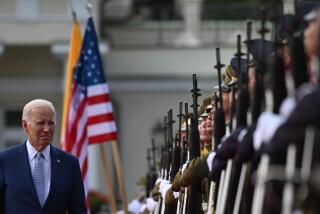Shultz Tells Allies U.S. Will Keep Pressure on Moscow : Sees Chance of Progress in Geneva
- Share via
BRUSSELS — Secretary of State George P. Shultz told European allies today that the United States will “keep the presure on” Moscow to salvage promising elements of a sweeping arms control compromise that eluded President Reagan and Soviet leader Mikhail S. Gorbachev.
“We’re in a different ballgame,” Shultz said.
Representatives of the North Atlantic Treaty Organization, though disappointed with the outcome of the Reagan-Gorbachev summit, expressed “warm appreciation” for Reagan’s attempt to forge an arms control agreement with the Soviet leader.
“We agreed that possibilities for significant progress had emerged in a number of areas and the underlying importance of following these up energetically in the appropriate negotiating (forums),” NATO Secretary-General Peter Carrington said in a statement after a three-hour meeting between Shultz and NATO members.
‘Not a Failure’
“In the British judgment,” Minister of State Timothy Renton said, “Reykjavik certainly is not a failure. It’s just a step along a long and laborious road.”
Shultz told a news conference after the closed-door meeting with NATO members that American negotiators will try to build on progress from the Iceland talks at arms control sessions now in progress in Geneva.
There is a “perfectly good possibility” of reaching agreements with Moscow on intermediate-range nuclear missiles and nuclear testing, Shultz said.
Accords on those and other areas collapsed Sunday when Reagan balked at restricting his Strategic Defense Initiative, the space-based anti-missile defense program known as “Star Wars.” (Story on Page 5.)
‘Don’t Throw Away Shoes’
About the Russian stand on “Star Wars,” Belgian Foreign Minister Leo Tindemans said, “There is an old saying: Don’t throw away your old shoes before you have got new ones. What (the Soviets) are asking now is that the United States (doesn’t) buy new shoes, but throw away the old ones.”
Shultz conceded that the allies were disappointed but cited “a sense of astonishment and pleasure at how much material had been brought up to the surface and identified as potentials.
“I was very encouraged and pleased with the degree to which people felt . . . it would have been a tragic mistake not to go to Reykjavik and make this effort, and it would be a tragic mistake not to follow up,” he said.
“We need to gear ourselves up to do that and keep the pressure on any way we can.”
Shultz told reporters Sunday night at the summit’s conclusion of a lack of “oomph” to reach smaller agreements after the larger deal faltered over Star Wars. Today, he talked up the prospects for the Geneva negotiations, which have been under way since March, 1985.
Officials Won Over
Aides said Shultz had won over a number of skeptical ministers, who are vitally interested in arms control, to his point of view.
In public statements, the ministers stressed the importance of building on the seeds of the failed accord.
West German Foreign Minister Hans-Dietrich Genscher said the results “should serve as the basis for urgent continuation” of the Geneva talks.
More to Read
Sign up for Essential California
The most important California stories and recommendations in your inbox every morning.
You may occasionally receive promotional content from the Los Angeles Times.











